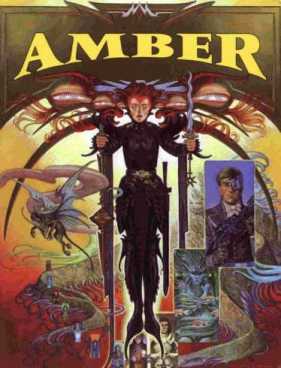
The Amber Diceless Roleplaying Game is a role-playing game created and written by Erick Wujcik, set in the fictional universe created by author Roger Zelazny for his Chronicles of Amber. The game is unusual in that no dice are used in resolving conflicts or player actions; instead a simple diceless system of comparative ability, and narrative description of the action by the players and gamemaster, is used to determine how situations are resolved.

Fudge is a generic role-playing game system for use in freeform role-playing games. The name "FUDGE" was once an acronym for Freeform Universal DonatedGaming Engine and, though the acronym has since been dropped, that phrase remains a good summation of the game's design goals. Fudge has been nominated for an Origins Award for Best Role-Playing Game System for the Deryni Adventure Game.

The Ringworld science fiction role-playing game was published by Chaosium in 1984, using the Basic Role-Playing system for its rules and Larry Niven's Ringworld novels as a setting.
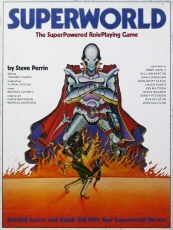
Superworld is a superhero-themed role-playing game published by Chaosium in 1983 that uses the generic Basic Role-Playing rules system. The game began as just one part of the Worlds of Wonder product before being published as a stand-alone game. In competition against other well-established and popular superhero games, Superworld never found an audience, and was discontinued after only three supplements were published for it.
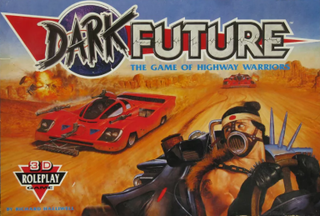
Dark Future is a post-apocalyptic miniatures wargame published by Games Workshop in 1988.

Nobilis is a contemporary fantasy tabletop role-playing game created by Jenna K. Moran, writing under the name R. Sean Borgstrom. The player characters are "Sovereign Powers" called the Nobilis; each Noble is the personification of an abstract concept or class of things such as Time, Death, cars, or communication. Unlike most role-playing games, Nobilis does not use dice or other random elements to determine the outcome of characters' actions, but instead uses a point-based system for task resolution.
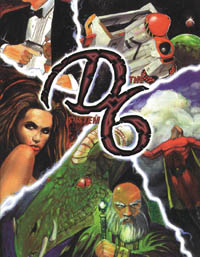
The D6 System is a role-playing game system published by West End Games (WEG) and licensees. While the system is primarily intended for pen-and-paper role-playing games, variations of the system have also been used in live action role-playing games and miniature battle games. The system is named after the 6-sided die, which is used in every roll required by the system.

Polymancer was a magazine covering roleplaying games and related hobbies such as miniatures, wargaming, and LARPs. The magazine was published in Canada by Polymancer Studios Inc. It was distributed across the United States, across Canada, in the UK, in Australia, and in New Zealand, as well as having hard copies archived with Archives Canada. The first issue was published in 2004 and it ran for 32 issues.
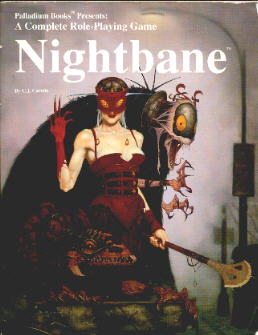
Nightbane is a dark fantasy role-playing game and setting created by C. J. Carella and published by Palladium Books.

Dark Conspiracy is a near-future horror role-playing game (RPG) originally written by Lester W. Smith and published by Game Designers' Workshop (GDW) in 1991. Several newer editions have been published.

Masterbook is a generic role-playing game that was published by West End Games (WEG) in 1994.

Conspiracy X is a role-playing game (RPG) originally released by New Millennium Entertainment in 1996, and since revised and released by several publishers including Steve Jackson Games and Eden Studios, Inc. In all versions, the setting posits that aliens are insiduously taking over the world, reminiscent of The X-Files.
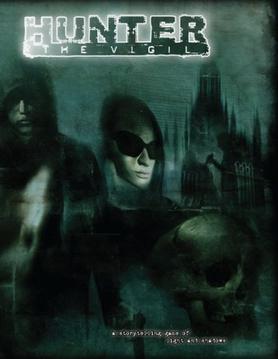
Hunter: The Vigil is a tabletop role-playing game originally published by White Wolf Publishing on August 14, 2008, and is the sixth game in their game series Chronicles of Darkness – a reboot of the World of Darkness series. Led by a storyteller, players take the roles of people who have learned of the existence of the supernatural, and fight back against monsters as groups of hunters.

Daredevils is a tabletop role-playing game published by Fantasy Games Unlimited (FGU) in 1982 that is meant to emulate pulp magazine fiction of the 1930s.

Dragonlance: Fifth Age is an accessory for the SAGA System, published in 1996. It uses the setting of Dragonlance, which originally was used in the Advanced Dungeons & Dragons fantasy role-playing game.

Maléfices, subtitled "The role-playing game with the scent of sulphur", was published by Jeux Descartes in 1985 as the first original French-language horror role-playing game. Three editions, 13 adventures and a bestiary have been published, and a fourth edition is being developed.

The Conan Role-Playing Game is a fantasy role-playing game published by TSR, Inc. in 1985 that is based on the Conan the Barbarian stories by Robert E. Howard, Lin Carter, Andrew J. Offutt. and Robert Jordan.
Saikoro Fiction is a Japanese role-playing game universal system developed by Touichirou Kawasima and presented by Adventure Planning Service.

The Lost Shrine of Kasar-Khan is an adventure published by Integrated Games in 1985 for fantasy role-playing games.
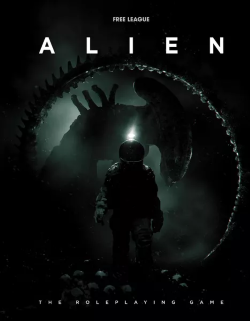
Alien: The Roleplaying Game is a science fiction horror role-playing game based on the Alien film franchise. It was published by Free League Publishing in 2019. The game has won three ENNIE Awards.



















